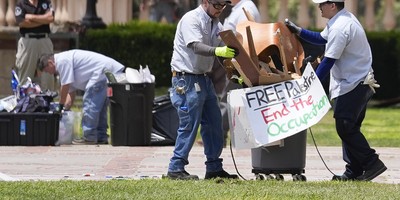There is a new course being offered at UNC-Wilmington in the spring semester of 2009. Before I go any further, let me assure you that I’m not making this up. The course, called “Effective Interactions with African-American Males,” is offered for credit in both the Social Work and Education departments. Unbelievably, it is offered, not just for senior credit, but for potential graduate credit, too.
A brief course description may help readers understand why I’ve asserted for years that social work and education are in a tight race to determine which can become the most intellectually vacuous and least relevant discipline in academia.
I’ve reprinted each of the two paragraphs of the course description with a few questions for the professor (Dr. Lethardus Goggins II) following each paragraph:
“Using an African-centered philosophical worldview and a racial socialization framework, this class will use participatory education to equip undergraduate and/or graduate students, to “better” understand and effectively work alongside and with young adult African-American men. The core tenets underlying this class are racial oppression exists, matters, is ubiquitous and pernicious and that those most affected are often ignorant of this reality.”
1. A university course using an “African-centered worldview” is deemed to be chic. Could a course call itself “white-centered” or even “European-centered” and garner the same enthusiasm from the diversity crowd?
2. If your answer to #1 was “no,” is the diversity crowd really diverse?
3. Does “racial socialization” include constant discussion of race on behalf of social work professors? If they could ever shut up, could we as a country experience “racial un-socialization”? Wouldn’t that be better?
4. Why the derisive quotes around “better”? Is there some suggestion that whites are not at all good at understanding and working around black males?
Recommended
5. What if I am a postmodernist and believe that racial oppression really isn’t an objective truth? What if my truth is that racial oppression exists only in social work and education classes?
6. Are the terms “ubiquitous” and “pernicious” African-centered or European-centered? What about the term “ignorant”?
7. Blacks (about 12% of the population) usually choose a white victim when committing armed robbery. Aside from carrying a handgun, how do whites make those interactions with African-American males more effective?
“Students will critically examine the social and emotional effects of racism on academic, occupational, cultural and relational well-being of African-American males. Students will discuss relevant readings, media analysis, community-based research, and self-reflection. Students will also examine and develop strategies to restore a healthy definition of African-American manhood and its significance for self, family, and community relationships; culminating in a community restoration initiative proposal.”
8. Will students in “Effective Interactions with African-American Males” critically examine split infinitives?
9. Will the “relevant readings” in this course include articles by Thomas Sowell, Walter Williams, and John McWhorter?
10. How much class time will be spent on self-reflection?
11. Does today’s college student really need to spend more time thinking about himself?
12. Does self-reflection ever lead to self-absorption? Does it ever lead to greater social consciousness, or concern for others?
13. Has there not already been enough talk about African American males’ “manhood”? Isn’t most of it stereotypical?
14. What would happen if you talked to a member of the Crips or the Bloods about “self,” “family,” and “community relationships”? Do you think he might pop a cap in your ass? Do you think he might make you his girlfriend?
15. How do I learn more about this “community restoration initiative proposal”? Will it be submitted to a community organizer?
16. And, finally, why were copies of your new course description sent to the Upperman African American Cultural Center? How can we have effective interactions with you when you continue to segregate yourselves from us?
I once believed the diversity crowd when it claimed an interest in bringing blacks and whites together for more meaningful interaction. Now I see them as specious and downright deceptive. I almost detect a colored quality in their statements.

























Join the conversation as a VIP Member